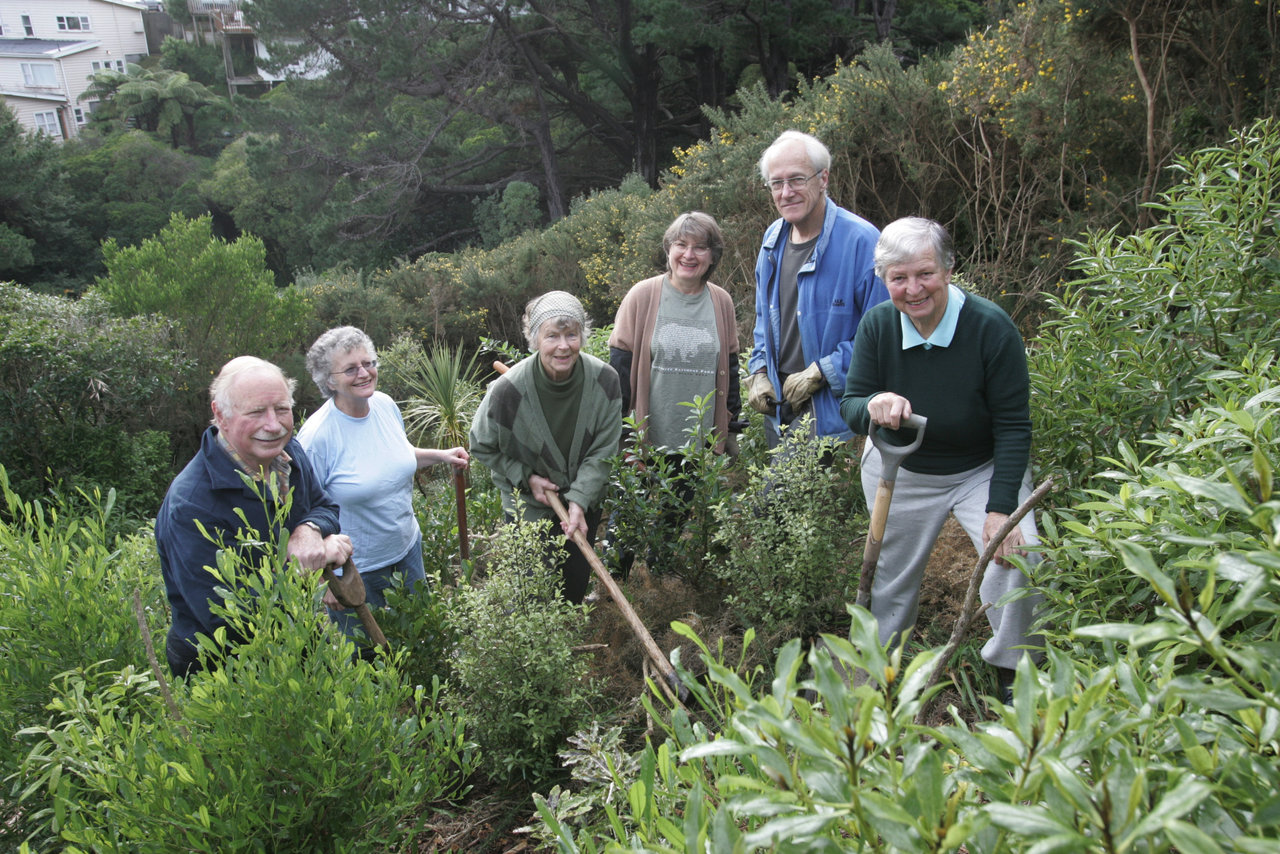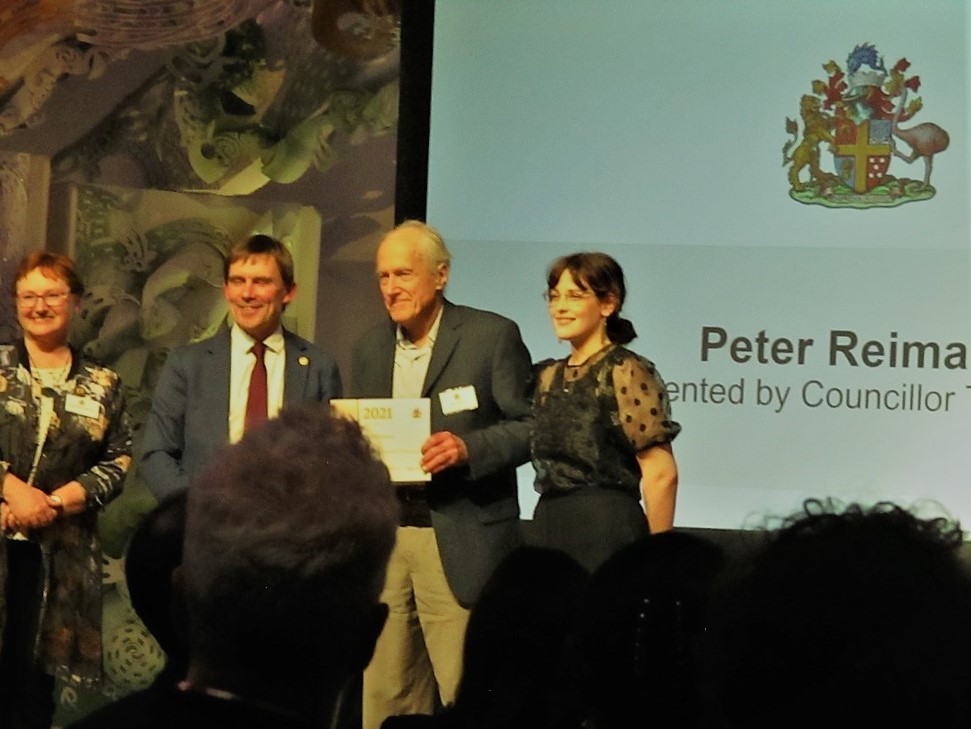Trelissick Park Restoration
Within Wellington City, a large expanse of hillside, valley, stream and parkland that encompasses Trelissick Park and Ngaio Gorge is being restored by community volunteers to create a beautiful wilderness area. Groups involved in this restoration include the Highland Park Progressive Association, Ngaio Crofton Downs Residents’ Association, Royal Forest and Bird Protection Society, Wellington Botanical Society and the Wadestown Residents’ Association.
Wellington City Council provides support with pest control, supply of native plants, track and bridge work, erecting signage and information boards and stream bank strengthening. The Greater Wellington Regional Council also provide support with pest control.
The projects undertaken by the Trelissick Park Group (TPG) work towards the Group's Five Year Plan (August 2021 update) and a key means of implementing the Group's plan revolves around the scheduled working bees.
Main Activities of the TPG
- Monitoring and reporting on problems affecting environmental health in the park, such as slips, stream bank erosion, pollution, rubbish, fallen trees, animal and plant pests.
- Servicing bait stations and traps for rodents.
- Organising working bees to clear weed-infested areas of the park and replant them with native trees.
- Liaising with adopt a spot volunteers.
- Hosting visiting groups such as Conservation Volunteers, corporate and school groups, scouts.
- Making representations to local, regional and central government agencies on environmental policy and planning initiatives relevant to the wilderness status of Trelissick Park, as well as the catchment of the Kaiwharawhara Stream.
Working Bee Tasks
- Infill planting in recently planted areas
- Planting in weed-controlled areas
- Releasing around recently planted trees
- Weed removal, including tradescantia, montbretia, sycamore, buddleia, broom and wattle.
The main planting period is July–September each year.
Please report any problems such as trees fallen across tracks, rubbish dumping, slips, vandalism and noxious weeds to Wellington City Council at Report a Problem or to 04 499 4444.
Please report pollution in streams to the Greater Wellington Pollution Hotline 0800 496 734.
Working Bee Programme - next few dates
> Sunday 4 August 2024 at 1:30 p.m. Lower Ngaio Gorge Road Entrance 6 - for planting near the entrance and near the magazines. Plus releasing and weeding if time permits.
> Wednesday 14 August 2024 at 1:30 p.m. Ngaio Gorge Road (upper layby) Entrance 5 - to release plants upstream of the debris trap; remove blackberry; possibly track repairs.
> Sunday 1 September 2024 at 1:30 p.m. Ngaio Gorge Road (upper layby) Entrance 5 - for planting and weeding near the new Peter Reimann bench (main valley track at junction with the Forest Remnant Track).
See the Maps & Tracks page for entrance locations.
all scheduled work bees will commence at 1:30 p.m. (and will finish by about 3:30 p.m.)
If the weather is wet the working bee will be transferred to the same day in the following week. Please wear good footwear and bring general gardening tools with you such as gloves, loppers, grubbers, shears, pruning saws...hand tools only please.
Contact by email the Trelissick Park Group for more information on place and confirmation of dates and to get on the working bee mailing list. The email address is trelissickgroup@gmail.com
Adopt a Spot Scheme
This scheme is designed to encourage people to adopt their own spot within the park to look after. This can be done at any time convenient to them rather than having to work in with a working bee schedule. The size and location of your spot will be with collaboration with the TPG.
If you are interested, contact the Trelissick Park Group email address: trelissickgroup@gmail.com
Adopt a spot tasksIf you decide to participate in the scheme you will be given a briefing by the group and a familiarisation visit of the spot you have chosen. You will then be free to establish your own work schedule and pace for a variety of satisfying tasks.
- Removal of pest plants such as tradescantia, montbretia, honeysuckle, wattle, barberry and fennel.
- Clear weeds and grass from around newly-planted native trees – generally this needs to be done for the next 3-4 years until the trees grow to be well-established.
- Replant areas cleared of pest plants. You will be supplied with suitable trees.
- Remove rubbish.
- Make suggestions for improvements
See also Adopt a Spot locations (2015 update) for locations of some historic, but typical Adopt-a-Spots! Hover your cursor over spots for more detailed information (may be browser dependent).
The adopt-a-spot coordinator can be contacted via email address trelissickgroup@gmail.com for current options.
Safety and health information for all volunteers
Volunteer Health and Safety Information (August 2015)Articles
- Water of Life - Restoring the Kaiwharawhara Stream
- Trelissick Park SMF Evaluation Report
- Trelissick Park SMF Summary Report
Project Awards

Weedbusters at work in Trelissick Park. From left: Olaf John, Carolyn Theiler, Frances Lee, Marilyn Hester, Peter Reimann, Dorothy Douglass. Photo by Barry Durrant.
Award nomination
- 2015 Nomination of Peter Reimann for Green Ribbon Award - Ministry for the Environment Green Ribbon Award nomination
- 2007 Nomination of Frances Lee for Green Ribbon Award - Ministry for the Environment Green Ribbon Award nomination
Awards received

2021 Absolutely Positively Wellingtonian Award "for Peter Reimann for his ongoing work leading the Trelissick Park Group".
- 2020 Volunteer Wellington's Corporate Challenge Mahi Aroha Award "for ongoing work and for marvellous hosting of volunteer groups - in particular hosting Treasury and Victoria University last year"
- 2010 Greater Wellington Regional Council/Department of Conservation/Wellington Hawke’s Bay Conservation Board Encore Awards – Winner, Community Partnerships Award
- 2006 Department of Conservation/Greater Wellington Regional Council – Winner “Weedbuster’s Award 06” for overall excellence
- 2005 Community Trust of Wellington – Winner of “Heritage & Environmental Category, Wellington Section” of Regional Awards
- 2005 Wellington Civic Trust – Certificate as a “Nominee for the Main Award”
- 2003 Wellington Civic Trust – Certificate as a “Nominee for the Main Award”
- 2003 Department of Conservation/Wellington Conservation Board – “Meritorious Award for Adopt-a-Spot Scheme”
- 1999 Wellington City Council – “Absolutely Positively Award”
- 1999 Department of Conservation/Wellington Regional Environmental Agency Winner – “Conservation Award”
Trelissick Park Group
Page last updated: 25 July 2024

